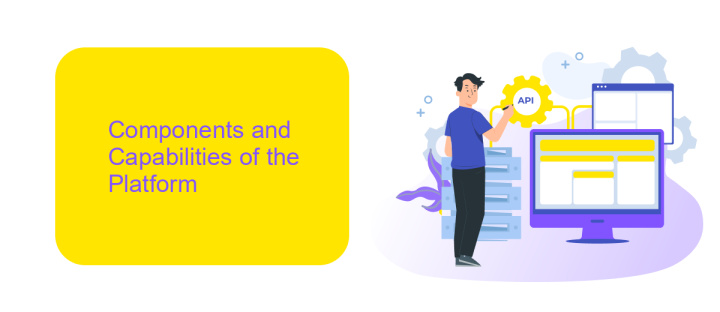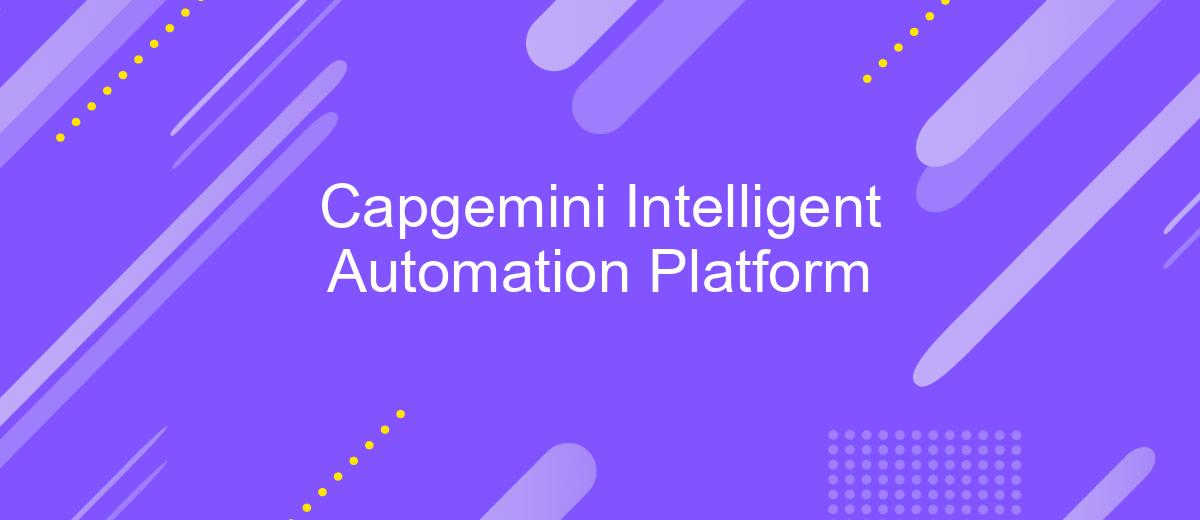Capgemini Intelligent Automation Platform
The Capgemini Intelligent Automation Platform is revolutionizing the way businesses operate by seamlessly integrating advanced technologies such as AI, machine learning, and robotic process automation. This innovative platform empowers organizations to enhance efficiency, reduce costs, and improve decision-making processes. By automating routine tasks and providing actionable insights, Capgemini enables businesses to focus on strategic growth and innovation, driving them towards a more agile and competitive future.
Introduction to Capgemini Intelligent Automation Platform
The Capgemini Intelligent Automation Platform is a cutting-edge solution designed to streamline business processes through advanced automation technologies. It leverages artificial intelligence, machine learning, and robotic process automation to enhance operational efficiency, reduce costs, and improve service delivery. By integrating these technologies, businesses can automate repetitive tasks, allowing human resources to focus on more strategic activities.
- Seamless integration with existing systems
- Scalable solutions tailored to business needs
- Enhanced data analytics for informed decision-making
- Improved compliance and risk management
- Increased productivity and reduced operational costs
Adopting the Capgemini Intelligent Automation Platform enables organizations to stay competitive in the rapidly evolving digital landscape. It not only optimizes current processes but also provides the agility to adapt to future technological advancements. With its comprehensive suite of tools and services, businesses can achieve a higher level of automation maturity, driving innovation and growth. This platform is a strategic investment for companies aiming to transform their operations and achieve sustainable success.
Components and Capabilities of the Platform

The Capgemini Intelligent Automation Platform is designed to enhance business processes through a suite of advanced components and capabilities. At its core, the platform integrates cutting-edge technologies such as artificial intelligence, machine learning, and robotic process automation to streamline operations. These components work in harmony to analyze data, identify patterns, and automate repetitive tasks, thereby improving efficiency and reducing human error. The platform's modular architecture allows for seamless scalability, ensuring that businesses can adapt to changing demands without disruption.
Moreover, the platform offers robust integration capabilities, allowing it to connect effortlessly with existing systems and third-party services. For instance, ApiX-Drive can be utilized to facilitate smooth integration processes, enabling businesses to synchronize data across various applications and automate workflows efficiently. This integration capability ensures that the platform can be tailored to meet specific organizational needs, providing a flexible solution that enhances overall productivity. With its comprehensive suite of tools, the Capgemini Intelligent Automation Platform empowers businesses to optimize their operations and drive innovation.
Benefits and Use Cases

The Capgemini Intelligent Automation Platform offers transformative benefits for businesses seeking to enhance operational efficiency and agility. By leveraging advanced automation technologies, organizations can streamline processes, reduce manual effort, and minimize errors, leading to significant cost savings and improved productivity. This platform empowers companies to innovate faster and respond to market changes with greater agility.
- Cost Reduction: Automating repetitive tasks reduces labor costs and increases efficiency.
- Enhanced Accuracy: Minimizes human errors, ensuring higher data accuracy and reliability.
- Scalability: Easily adapts to growing business needs without significant additional investment.
- Improved Compliance: Ensures adherence to regulatory standards through consistent process execution.
- Customer Satisfaction: Faster and more reliable service delivery enhances customer experiences.
In various industries, the platform is utilized to optimize supply chain operations, streamline customer service processes, and enhance data management. For instance, in the financial sector, it automates transaction processing and compliance checks. In manufacturing, it optimizes production workflows and quality control. By integrating intelligent automation, businesses can achieve strategic goals, driving growth and competitiveness in an increasingly digital world.
Implementation Considerations and Best Practices

Implementing the Capgemini Intelligent Automation Platform requires careful planning and strategic alignment with organizational goals. It's crucial to assess existing processes and identify areas where automation can deliver the most value. Engaging stakeholders early in the process ensures buy-in and helps in tailoring solutions that meet specific business needs.
Successful deployment hinges on a robust infrastructure and the right skill set. Organizations should invest in training their workforce to work alongside automated systems, fostering a culture of continuous improvement. Additionally, a phased approach to implementation allows for iterative testing and refinement, reducing risks associated with large-scale rollouts.
- Conduct a thorough process assessment to identify automation opportunities.
- Engage stakeholders to ensure alignment with business objectives.
- Invest in training and change management to support workforce adaptation.
- Utilize a phased implementation approach for better risk management.
Monitoring and evaluation are critical post-implementation. Establishing KPIs and regularly reviewing performance metrics ensures the platform delivers the expected benefits. Continuous feedback loops and adaptation to evolving business needs will sustain the value of the automation platform over time.
Future Roadmap and Industry Trends
As we look to the future, the Capgemini Intelligent Automation Platform is poised to evolve in response to emerging industry trends and technological advancements. The roadmap includes enhancing AI capabilities to provide more nuanced decision-making support, integrating with cutting-edge technologies like blockchain for improved data security, and expanding its cloud-based offerings to ensure scalability and flexibility. By focusing on these areas, Capgemini aims to empower businesses to achieve greater efficiency and innovation in their operations.
In addition, the platform is set to embrace the growing trend of hyperautomation, where advanced tools like AI, machine learning, and robotic process automation (RPA) are combined to automate complex business processes. Integration services such as ApiX-Drive will play a crucial role in this evolution, enabling seamless connectivity between disparate systems and facilitating real-time data exchange. This approach not only streamlines operations but also enhances the agility and responsiveness of businesses, allowing them to adapt quickly to changing market demands and stay ahead of the competition.
FAQ
What is Capgemini Intelligent Automation Platform?
How does Capgemini Intelligent Automation Platform integrate with existing systems?
What types of processes can be automated using Capgemini Intelligent Automation Platform?
How can businesses start implementing automation with Capgemini Intelligent Automation Platform?
What are the benefits of using Capgemini Intelligent Automation Platform?
Apix-Drive will help optimize business processes, save you from a lot of routine tasks and unnecessary costs for automation, attracting additional specialists. Try setting up a free test connection with ApiX-Drive and see for yourself. Now you have to think about where to invest the freed time and money!

